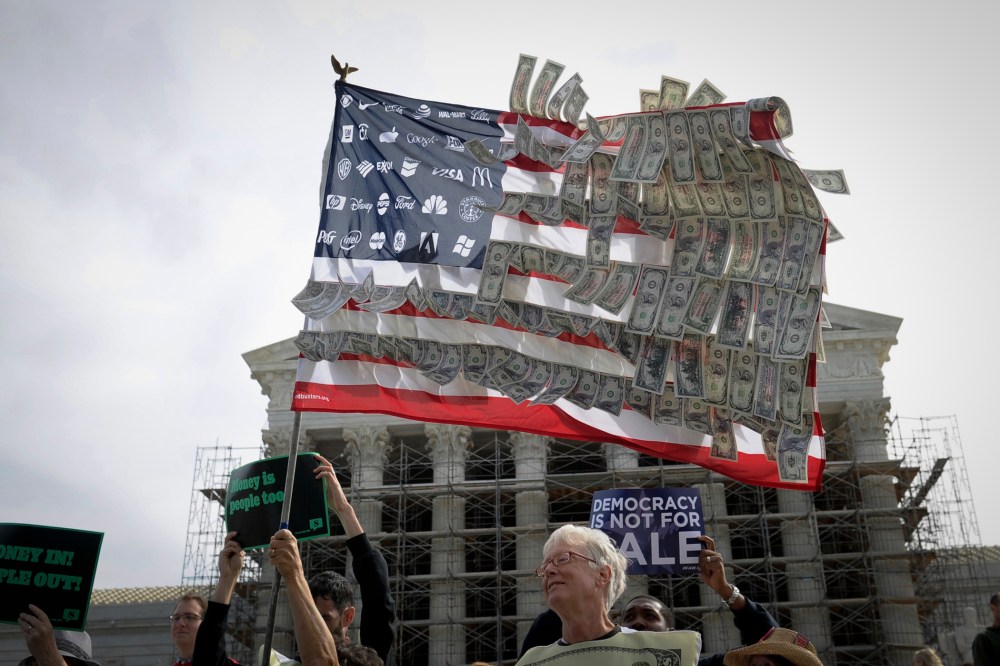Five years ago, during his second State of the Union Address, Barack Obama looked over the podium at the the justices of Supreme Court sitting in front of him on the floor of the House of Representatives to scold them for a decision they made half a decade ago Wednesday.
“Last week, the Supreme Court reversed a century of law that I believe will open the floodgates for special interests — including foreign corporations — to spend without limit in our elections,” Obama said, sparking a brief media controversy over alleged breach of protocol.
The president’s fear was widespread after the court’s Citizens United ruling, which allowed corporations and unions to spend money on political campaigns. It was echoed by Democrats, good government groups, and some Republicans, like Sen. John McCain, who worried the floodgates would open on political ads from McDonalds and WalMart and Goldman Sachs. Critics feared ads like, “Don’t vote for Mike Capuano, he’s a horrendous guy, brought to you by the Exxon Corporation,” as the Massachusetts Democrat said during a hearing in 2010 while pushing a bill to roll back the decision.
RELATED: A hidden measure that could devastate campaign finance laws
But none of that came to pass. Instead, after half a decade, the decision’s actual effect — including its judicial progeny — has been decidedly different, perhaps even more dramatic than expected.
“The fallout has been somewhat different in that people had predicted that major corporations would be making major independent expenditures directly,” said Larry Noble, the former general counsel to the Federal Election Commission, who is now a campaign finance reform advocate at the Campaign Legal Center. “But what has happened has been much more dangerous.”
Instead of corporations spending directly in the political process, wealthy individuals, including corporate executives, have opened their personal checkbooks, while corporations are more likely to funnel money through so-called dark money groups that allow donors to remain secret.
“The Citizens United decision was wrong, and it has caused real harm to our democracy,” President Obama said in a statement Wednesday. “With each new campaign season, this dark money floods our airwaves with more and more political ads that pull our politics into the gutter. It’s time to reverse this trend. Rather than bolster the power of lobbyists and special interests, Washington should lift up the voices of ordinary Americans and protect their democratic right to determine the direction of the country that we love.”

Corporations weren’t particularly interested in taking advantage of the new independent expenditure vehicles that became known as super PACs, which allow for unlimited spending in elections as long as it’s not coordinated with candidates. A 2013 poll of corporate PAC and trade association staffers found they preferred traditional PACs, trade associations and other nonprofits.
Just 12% of donations from super PACs came from businesses in the 2012 presidential election, according to a report from the liberal groups Demos and U.S. PIRG Education Fund.
“Corporate political spending changed very little following the Citizens United ruling,” an analysis if 2012 campaign spending from three University of New Mexico political scientists found. And while occasional stories about foreign-owned companies donating to super PACs have cropped up, existing prohibitions on foreign national donations remain in place and there hasn’t appeared to be a massive wave of spending to super PACs.
For conservatives, this is vindication of their support for Citizens United. “Corporate money is not swamping the system, and elections are more competitive,” Brad Smith, the founder of the Center for Competitive Politics, said earlier this month at a conference of the American Association of Law Schools.











